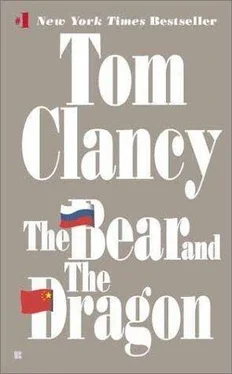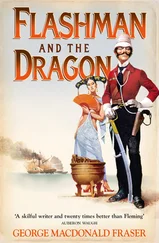Tom Clancy - The Bear and the Dragon
Здесь есть возможность читать онлайн «Tom Clancy - The Bear and the Dragon» весь текст электронной книги совершенно бесплатно (целиком полную версию без сокращений). В некоторых случаях можно слушать аудио, скачать через торрент в формате fb2 и присутствует краткое содержание. Год выпуска: 2001, ISBN: 2001, Жанр: Триллер, на английском языке. Описание произведения, (предисловие) а так же отзывы посетителей доступны на портале библиотеки ЛибКат.
- Название:The Bear and the Dragon
- Автор:
- Жанр:
- Год:2001
- ISBN:780425180969
- Рейтинг книги:3 / 5. Голосов: 1
-
Избранное:Добавить в избранное
- Отзывы:
-
Ваша оценка:
- 60
- 1
- 2
- 3
- 4
- 5
The Bear and the Dragon: краткое содержание, описание и аннотация
Предлагаем к чтению аннотацию, описание, краткое содержание или предисловие (зависит от того, что написал сам автор книги «The Bear and the Dragon»). Если вы не нашли необходимую информацию о книге — напишите в комментариях, мы постараемся отыскать её.
The Bear and the Dragon — читать онлайн бесплатно полную книгу (весь текст) целиком
Ниже представлен текст книги, разбитый по страницам. Система сохранения места последней прочитанной страницы, позволяет с удобством читать онлайн бесплатно книгу «The Bear and the Dragon», без необходимости каждый раз заново искать на чём Вы остановились. Поставьте закладку, и сможете в любой момент перейти на страницу, на которой закончили чтение.
Интервал:
Закладка:
Colonel Boyle was flying the UH-60A in which Diggs was riding. Diggs was in the jump seat immediately aft and between the pilots’ seats. They were cruising about five hundred feet over the ground.
“Oops, that platoon down there just walked into something,” Boyle reported, pointing. Sure enough the lead tank’s blinking yellow light started flashing the I’m dead signal.
“Let’s see how the platoon sergeant recovers,” General Diggs said.
They watched, and sure enough, the sergeant pulled the remaining three tanks back while the crew bailed out of the platoon leader’s M1A2 main battle tank. As a practical matter, both it and its crew would probably have survived whatever administrative “hit” it had taken from the Germans. Nobody had yet come up with a weapon to punch reliably through the Chobham armor, but someone might someday, and so the tank crews were not encouraged to think themselves immortal and their tanks invulnerable.
“Okay, that sergeant knows his job,” Diggs observed, as the helicopter moved to another venue. The general saw that Colonel Masterman was making notes aplenty on his pad. “What do you think, Duke?”
“I think they’re at about seventy-five percent efficiency, sir,” the G-3 operations officer replied. “Maybe a little better. We need to put everybody on the SimNet, to shake ’em all up a little.” That was one of the Army’s better investments. SIMNET, the simulator network, comprised a warehouse full of M1 and Bradley simulators, linked by supercomputer and satellite with two additional such warehouses, so that highly complex and realistic battles could be fought out electronically. It had been hugely expensive, and while it could never fully simulate training in the field, it was nevertheless a training aid without parallel.
“General, all that time in Yugoslavia didn’t help Lisle’s boys,” Boyle said from the chopper’s right seat.
“I know that,” Diggs agreed. “I’m not going to kill anybody’s career just yet,” he promised.
Boyle’s head turned to grin. “Good, sir. I’ll spread that word around.”
“What do you think of the Germans?”
“I know their boss, General Major Siegfried Model. He’s damned smart. Plays a hell of a game of cards. Be warned, General.”
“Is that a fact?” Diggs had commanded the NTC until quite recently, and had occasionally tried his luck at Las Vegas, a mere two hours up I-15 from the post.
“Sir, I know what you’re thinking. Think again,” Boyle cautioned his boss.
“Your helicopters seem to be doing well.”
“Yep, Yugoslavia was fairly decent training for us, and long as we have gas, I can train my people.”
“What about live-fire?” the commanding general of First Tanks asked.
“We haven’t done that in a while, sir, but again, the simulators are almost as good as the real thing,” Boyle replied over the intercom. “But I think you’ll want your track toads to get some in, General.” And Boyle was right on that one. Nothing substituted for live-fire in an Abrams or a Bradley.
The stakeout on the park bench turned out to be lengthy and boring. First of all, of course, they’d pulled the container, opened it, and discovered that the contents were two sheets of paper, closely printed with Cyrillic characters, but encrypted. So the sheet had been photographed and sent off to the cryppies for decryption. This had not proven to be easy. In fact, it had thus far proven to be impossible, leading the officers from the Federal Security Service to conclude that the Chinese (if that was who it was) had adopted the old KGB practice of using one-time pads. These were unbreakable in theoretical terms because there was no pattern, formula, or algorithm to crack.
The rest of the time was just a matter of waiting to see who came to pick up the package.
It ended up taking days. The FSS put three cars on the case. Two of them were vans with long-lens cameras on the target. In the meanwhile, Suvorov/Koniev’s apartment was as closely watched as the Moscow Stock Exchange ticker. The subject himself had a permanent shadow of up to ten trained officers, mainly KGB-trained spy-chasers instead of Provalov’s homicide investigators, but with a leavening of the latter because it was technically still their case. It would remain a homicide case until some foreign national-they hoped-picked up the package under the bench.
Since it was a park bench, people sat on it regularly. Adults reading papers, children reading comic books, teenagers holding hands, people chatting amiably, even two elderly men who met every afternoon for a game of chess played on a small magnetic board. After every such visit, the stash was checked for movement or disturbance, always without result. By the fourth day, people speculated aloud that it was all some sort of trick. This was Suvorov/Koniev’s way of seeing if he were being trailed or not. If so, he was a clever son of a bitch, the surveillance people all agreed. But they already knew that.
The break came in the late afternoon of day five, and it was the man they wanted it to be. His name was Kong Deshi, and he was a minor diplomat on the official list, age forty-six, a man of modest dimensions, and, the form card at the Foreign Ministry said, modest intellectual gifts-that was a polite way of saying he was considered a dunce. But as others had noted, that was the perfect cover for a spy, and one which wasted a lot of time for counterintelligence people, making them trail dumb diplomats all over the world who turned out to be nothing more than just that-dumb diplomats-of which the global supply was ample. The man was walking casually with another Chinese national, who was a businessman of some sort, or so they’d thought. Sitting, they’d continued to chat, gesturing around until the second man had turned to look at something Kong had pointed at. Then Kong’s right hand had slipped rapidly and almost invisibly under the bench and retrieved the stash, possibly replacing it with another before his hand went back in his lap. Five minutes later, after a smoke, they’d both walked off, back in the direction of the nearest Metro station.
“Patience,” the head FSS officer had told his people over the radio circuit, and so they’d waited over an hour, until they were certain that there were no parked cars about keeping an eye on the dead-drop. Only then had an FSS man walked to the bench, sat down with his afternoon paper, and pulled the package. The way he flicked his cigarette away told the rest of the team that there had been a substitution.
In the laboratory, it was immediately discovered that the package had a key lock, and that got everyone’s attention. The package was x-rayed immediately and found to contain a battery and some wires, plus a semi-opaque rectangle that collectively represented a pyrotechnic device. Whatever was inside the package was therefore valuable. A skilled locksmith took twenty minutes picking the lock, and then the holder was opened to reveal a few sheets of flash paper. These were removed and photographed, to show a solid collection of Cyrillic letters-and they were all random. It was a one-time-pad key sheet, the best thing they could have hoped to find. The sheets were refolded exactly as they had been replaced in the holder, and then the thin metal container-it looked like a cheap cigarette case-was returned to the bench.
“So?” Provalov asked the Federal Security Service officer on the case.
“So, the next time our subject sends a message, we’ll be able to read it.”
“And then we’ll know,” Provalov went on.
“Perhaps. We’ll know something more than we know now. We’ll have proof that this Suvorov fellow is a spy. That I can promise you,” the counterintelligence officer pronounced.
Provalov had to admit to himself that they were no closer to solving his murder case than they’d been two weeks before, but at least things were moving, even if the path merely led them deeper into the fog.
Читать дальшеИнтервал:
Закладка:
Похожие книги на «The Bear and the Dragon»
Представляем Вашему вниманию похожие книги на «The Bear and the Dragon» списком для выбора. Мы отобрали схожую по названию и смыслу литературу в надежде предоставить читателям больше вариантов отыскать новые, интересные, ещё непрочитанные произведения.
Обсуждение, отзывы о книге «The Bear and the Dragon» и просто собственные мнения читателей. Оставьте ваши комментарии, напишите, что Вы думаете о произведении, его смысле или главных героях. Укажите что конкретно понравилось, а что нет, и почему Вы так считаете.






![Александр Ирвин - Tom Clancy’s The Division 2. Фальшивый рассвет [litres]](/books/417744/aleksandr-irvin-tom-clancy-s-the-division-2-falsh-thumb.webp)




